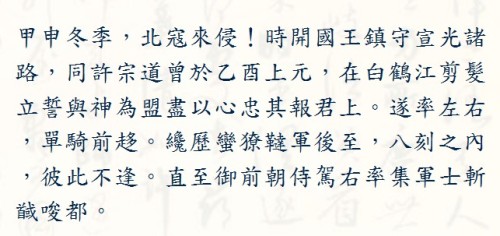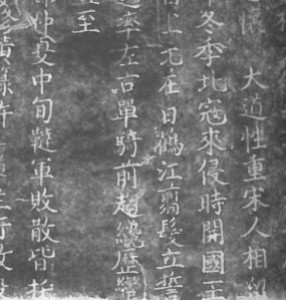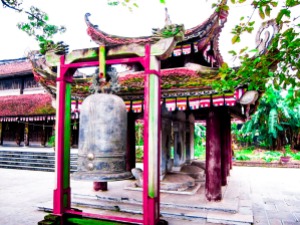In the post below, I wrote about some information in an inscription that was inscribed on a bell at a Daoist temple in the Red River Delta, the Thông Thánh Daoist Temple in Bạch Hạc, somewhere between 1314 and 1324.
The text of the inscription was composed by a Daoist master from Fujian by the name of Xu Zongdao/Hứa Tông Đạo 許宗道 who had taken up residence in the Red River Delta, and who was close with the Trần family that ruled over the region, and which also had roots in Fujian.
Xu Zongdao was residing in the Red River Delta when the Mongols attacked in the late thirteenth century. He mentions this in his inscription.

I was looking at a version of this inscription online where it has the original classical Chinese, the Chinese characters transcribed into quốc ngữ, and a modern Vietnamese translation.
The Vietnamese translation states that in 1284 “Northern bandits came and invaded!”(giặc Bắc đến xâm lược!)
I was surprised to see an exclamation point there, as classical Chinese doesn’t really have punctuation. There are some terms that are used to add emphasis though, so I took a look at what the original Chinese text said. As I suspected, there was nothing there that indicated emphasis. However, in the online version of this text, an exclamation point had been added (北寇來侵!)

Another point I noticed was that while the Vietnamese translation used a generic term for “bandit” (giặc), the term in the text (寇 khấu) is, I would argue, more specific. One can have bandits in one’s own kingdom, but khấu were often “outsiders” who attacked.
There was, for instance, the wokou/wako 倭寇, or “Japanese pirates” who attacked the Chinese coasts during the Ming Dynasty period.
Indeed, khấu has the sense of entering a place from the outside. I might therefore translate the above term as “Northern raiders.”

Why does any of this matter? I think it matters because when someone takes a matter-of-fact sentence like “Northern raiders came and invaded/trespassed” (Bắc khấu lai xâm) and renders it into Vietnamese as “Northern bandits came and invaded!” (Bắc đến xâm lược), and adds an exclamation point, two things happen.
First, some of the specificity of the original sentence is lost. And second, this new sentence becomes immediately recognizable and meaningful to modern Vietnamese, because they have been taught for the past 50 years that “Vietnamese” history is all about resisting foreign aggression, and that the number one threat has always been from “Northern bandits,” i.e., “the Chinese.”
So a sentence like “Northern bandits came and invaded!” makes complete sense to a contemporary Vietnamese reader.

Let us know, however, look at the context in which this sentence appears. It appears in a section of this inscription in which Xu Zongdao explains how he ended up residing in the Red River Delta.
向者,陳朝第二帝太宗皇帝丙子年間,治道太平,四方向化。時有大宋國福建路福州福清縣太平鄉海壇里道士許宗道,同流附舶乘興入南。
時太宗皇帝第六子昭文王,今入內檢校太尉,平章事,清化府路都元帥,賜金魚袋,上柱國,開國王,心懷大道,性重宋人,相留宗道於門墻,期以闡揚於道教。
Formerly, during the Bính Tý year [1276] in the reign of the second Trần Dynasty emperor, Emperor Thái Tông, all was at peace and people from the four directions came to be [morally] transformed. At that time, Daoist Master Xu Zongdao from Haitan Hamlet, Taiping Village, Fuqing District, Fu Prefecture, Fujian Circuit in the Great Song Kingdom boarded a ship with his followers, and on an impulse, entered the South.
At that time, the sixth son of Emperor Thái Tông, the Chiêu Văn Prince [Trần Nhật Duật], who is now Eunuch [? nhập nội 入內 ] Acting Commander-in-Chief, Manager of Affairs, Chief Military Commander of Thanh Hóa Garrison Circuit, having been granted a golden fish belt, and [the titles of] Supreme Pillar of State and Dynasty-Founding Prince, was fond of the Great Way [Đại Đạo] and valued Song people. He kept [Xu Zongdao] with his group of retainers so that [Xu Zongdao] could expound upon the teaching of the Way [Đạo giáo].
甲申冬季,北寇來侵!時開國王鎮守宣光諸路,同許宗道曾於乙酉上元,在白鶴江剪髮立誓與神為盟盡以心忠其報君上。遂率左右,單騎前趍。纔歷蠻獠韃軍後至,八刻之內,彼此不逢。直至御前朝侍駕右率集軍士斬馘唆都。仲夏中旬,韃軍敗散,皆托神王之福蔭也。
In the winter of the Giáp Thân year [1284], Northern raiders came and invaded. At that time the Dynasty-Founding Prince was guarding the various circuits in Tuyên Quang. Together with Xu Zongdao, on the fifteenth day of the first lunar month of the Ất Dậu year [1285], on the bank of the Bạch Hạc River, they shaved their heads and pledged to form a covenant with the spirit and to exhaust their loyalty in serving the monarch. Leading their followers, and each riding a horse, they set off. Shortly after crossing through Man Lão [territory], the Tartar [i.e., Mongol] troops arrived. For two hours the two sides did not engage in battle. Finally, from the right side of His Majesty’s carriage, [the Chiêu Văn Prince] led the assembled soldiers to kill [and cut off the head of] Sogetu. In the middle of summer, the Tartar troops were defeated and scattered. This was all due to the Divine King’s blessed protection.

So this reference to “Northern raiders/bandits” was made by a guy from “the North.” So which “north” was he referring to? The area to the north of the Sino-Vietnamese border? Or the area to the north of the Chinese world, where the Mongols came from?
And if “the North” has always been a problem for Vietnamese, then why did Trần Nhật Duật “value Song people”?
Indeed, the Đại Việt Sử Ký Toàn Thư states that “When the Song [Dynasty] was lost, its people came to us. Nhật Duật took them in. There was Zhao Zhong who served as his personal guard. Therefore, among the accomplishments in defeating the Yuan [i.e., Mongols], Nhật Duật had the most.”
初宋亡,其人歸我,日燏納之。有趙忠者,為家將,故敗元之功,日燏居多。Trước kia, nhà Tống mất, nhiều người Tống theo ta, Nhật Duật thu nạp họ, có Triệu Trung làm gia tướng. Cho nên chiến công đánh bại giặc Nguyên, Nhật Duật lập được nhiều hơn cả.

In other words, the “Northern” threat in the thirteenth century was a specific threat. And the response to it was specific as well.
However, a sentence like “Northern bandits came and invaded!”(giặc Bắc đến xâm lược!) with its exclamation point, turns away from specificity and tries to get the reader to see a common thread that supposedly stretches throughout “Vietnamese” history.
This Post Has 6 Comments
We all know that when Manchuria overthrew Ming dynasty and some loyal Ming Chinese fled to Vietnam and they became Minh Huong people later.
But very few people know that we also had something similar happened when Song dynasty fell to Mongolia, quite a few Chinese also fled to Vietnam and Ngo dinh Diem (the first president of South Vietnam from 1955 to 1963) was descendant of those Song Chinese people.
I read this information somehow from a Chinese newspaper, it mentioned that once Ngo dinh Diem confided to his close friend in Cholon, his ancestor came from Fujian, China when Mongolia conquered China.
Most Vietnamese were fed the hoax of millenial Chinese yearning of reconqureing Vietnam that they imagine things like [a common thread that supposedly stretches throughout “Vietnamese” history.]
There’s no continuity between the Song , the Mongols and the Ming , the
clashes between the diffferent Vietnam dynasties and the different giặc Bắc happened 2 or 300 hundred years apart
What continuity in VN is there between the Ly , the Tran , the Hô dynasties ,
each slaughtered their predecessor ?
The Manchu Ching intervened in VN in 1789 , not to conquer VN but to do
their overlord’s duty t the behest of the Lê dynasty
Ah, but I think you did just reveal a common thread: centuries of Vietnamese fighting Vietnamese.
That’s also a common thread in human history as well.
Vow! That’ s so penetrating , so profound , pertinent a remark : VN against Vn . Later on , 2 or 300 year trinh – nguyen contest
Actually, there is one historian in the US who told me a good “theme” for Vietnamese history. It’s a long history of Vietnamese breaking apart the country as they fight with each other, and then unifying it again, and with each unification, the country has gotten bigger. While one could argue that the borders in 1975 were the same as the ones the Nguyen ruled over, the level of direct control was certainly the highest that had ever been achieved in Vietnamese history.
Actually , more accurately, it was not VN against VN but polity against polity
I prefer dynasty or polity – centric historiography to nation-centric one
Minh Mang’s borders were larger , they extended into one- third to half of neighboring Laos ( Trâ’n Ninh ) and Cambodia (Trâ’n tây Thành )